Hindi cinema, popularly known as Bollywood and formerly as Bombay cinema, refers to the film industry based in Mumbai, engaged in production of motion pictures in Hindi language. The popular term Bollywood is a portmanteau of "Bombay" and "Hollywood". The industry is a part of the larger Indian cinema, which also includes South Indian cinema and other smaller film industries. The term 'Bollywood', often mistakenly used to refer to Indian cinema as a whole, only refers to Hindi-language films, with Indian cinema being an umbrella term that includes all the film industries in the country, each offering films in diverse languages and styles.
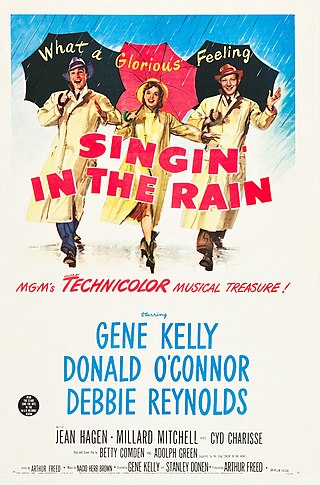
Musical film is a film genre in which songs by the characters are interwoven into the narrative, sometimes accompanied by dancing. The songs usually advance the plot or develop the film's characters, but in some cases, they serve merely as breaks in the storyline, often as elaborate "production numbers".
Hollywood usually refers to:
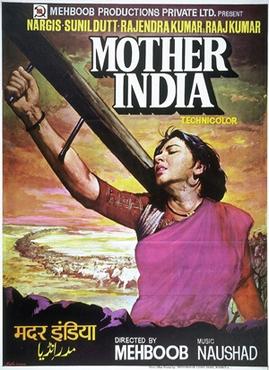
Mother India is a 1957 Indian epic drama film, directed by Mehboob Khan and starring Nargis, Sunil Dutt, Rajendra Kumar and Raaj Kumar. A remake of Khan's earlier film Aurat (1940), it is the story of a poverty-stricken village woman named Radha (Nargis), who in the absence of her husband, struggles to raise her sons and survive against a cunning money-lender amidst many troubles.

Ashok Kumar, was an Indian actor who attained iconic status in Indian cinema. He was considered the first big star of Indian cinema as well as the first lead actor to play an anti-hero. He also became the first star to reinvent himself, enjoying a long and hugely successful career as a character actor. He was a member of the cinematic Ganguly family. He was honoured in 1988 with the Dadasaheb Phalke Award, the highest national award for cinema artists, by the Government of India. He received the Padma Shri in 1962 and Padma Bhushan in 1999 for his contributions to Indian cinema.

Yash Raj Chopra was an Indian film director and film producer who worked in Hindi cinema. The founding chairman of the film production and distribution company Yash Raj Films, Chopra was the recipient of several awards, including 6 National Film Awards and 8 Filmfare Awards. He is considered among the best Hindi filmmakers, particularly known and admired for his romantic films with strong female leads. For his contributions to film, the Government of India honoured him with the Dadasaheb Phalke Award in 2001, and the Padma Bhushan in 2005. In 2006, British Academy of Film and Television Arts presented him with a lifetime membership, making him the first Indian to receive the honour.

Penmetsa Ram Gopal Varma, often referred to by his initials RGV, is an Indian film director, screenwriter and producer, known for his works in Telugu cinema in addition to Hindi, Kannada language films, and television. Varma has directed films across multiple genres, including parallel cinema and docudrama noted for their gritty realism, technical finesse, and craft. Regarded as one of the pioneers of new age Indian cinema, he was featured in the BBC World series Bollywood Bosses in 2004. In 2006, Grady Hendrix of Film Comment, published by the Film at Lincoln Center cited Varma as "Bombay's Most Successful Maverick" for his works on experimental films. He is known for introducing new talents, who eventually become successful in the Indian film industry.1
Tinsel town, Tinseltown, Tinsel Town or Tinsel-Town may refer to:

Dev Benegal is an Indian filmmaker and screenwriter, most known for his debut film English, August (1994), which won the Best Feature Film in English at the 42nd National Film Awards.
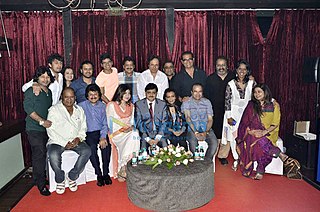
Hindi film songs, more formally known as Hindi Geet or filmi songs and informally known as Bollywood music, are songs featured in Hindi films. Derived from the song-and-dance routines common in Indian films, Bollywood songs, along with dance, are a characteristic motif of Hindi cinema which gives it enduring popular appeal, cultural value and context. Hindi film songs form a predominant component of Indian pop music, and derive their inspiration from both classical and modern sources. Hindi film songs are now firmly embedded in North India's popular culture and routinely encountered in North India in marketplaces, shops, during bus and train journeys and numerous other situations. Though Hindi films routinely contain many songs and some dance routines, they are not musicals in the Western theatrical sense; the music-song-dance aspect is an integral feature of the genre akin to plot, dialogue and other parameters.

Masala films of Indian cinema are those that blend multiple genres into one work. Masala films emerged in the 1970s and are still being created as of the 2020s. Typically these films freely blend action, comedy, romance, and drama, or melodrama. They also tend to be musicals, often including songs filmed in picturesque locations.

Anupama Vinod Chopra (née Chandra) is an Indian author, journalist and film critic who served as the festival director of the MAMI Mumbai Film Festival from 2015 to 2023. She is also the founder and editor of the now-defunct digital platform Film Companion, which offered a curated look at cinema with an emphasis on Indian film. She has written several books on Indian cinema and has been a film critic for NDTV and India Today, as well as the Hindustan Times. She also hosted a weekly film review show, The Front Row With Anupama Chopra, on Star World. She won the 2000 National Film Award for Best Book on Cinema for her first book Sholay: The Making of a Classic. Chopra joined the Indian iteration of the film journalism outlet The Hollywood Reporter in 2024, launched domestically in the same year by the RP Sanjiv Goenka Group.
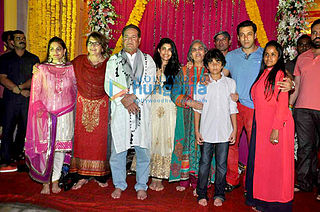
The Salim Khan family refers to the family of Salim Khan which is a prominent Indian show business family, and is one of the prominent Bollywood film clans. Multiple members of the family have been actors, screenwriters, film directors and producers in the Hindi film industry of India. Salim, one half of the duo Salim–Javed, is one of the most famous screenwriters in the history of Indian cinema. His son, actor Salman Khan, has been the prominent face of the family since the 1990s, as one of the biggest Bollywood movie stars in history of Indian cinema.
Tollywood may refer to these in Indian cinema:

Gulzar is an Indian Urdu poet, lyricist, author, screenwriter, and film director known for his works in Hindi cinema. He is regarded as one of greatest Urdu poets of this era. He started his career with music director S.D. Burman as a lyricist in the 1963 film Bandini and worked with many music directors including R. D. Burman, Salil Chowdhury, Vishal Bhardwaj and A. R. Rahman. Gulzar also writes poetry, dialogues and scripts. He directed films such as Aandhi and Mausam during the 1970s and the TV series Mirza Ghalib in the 1980s. He also directed Kirdaar in 1993.
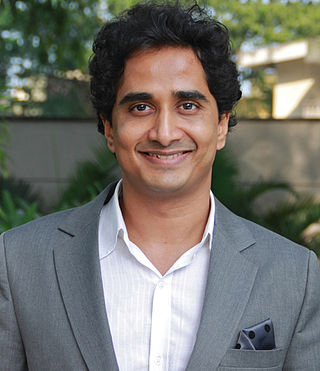
Kranti Kanade is a National Award winning Indian filmmaker. His films include Peepal Tree, CRD (film), Gandhi of the Month, Mahek and Chaitra. He studied at UCLA and FTII.

Anjali Patil is an Indian actress who works in Hindi, Marathi, Telugu and Tamil film productions. She has received several awards including a National Film Award and a Filmfare Marathi Award. She received the IFFI Best Actor Award (Female) Silver Peacock Award at the 43rd International Film Festival of India her role in the Sri Lankan film With You, Without You
Box Office India is an Indian film website dedicated to tracking, reporting, and analyzing the financial performance of films released in the Indian entertainment industry. Established in 2003, Box Office India has become a prominent source of data and insights regarding box office revenues, viewership trends, and industry analyses within the Bollywood industry as well as regional cinema in India. The website serves as a comprehensive source for box office statistics, including daily, weekly, and lifetime earnings of films across various Indian languages. Its traffic ranking in India is 83,665 as of 10 July 2021. A new Box Office India website went live on 20 January 2014.












